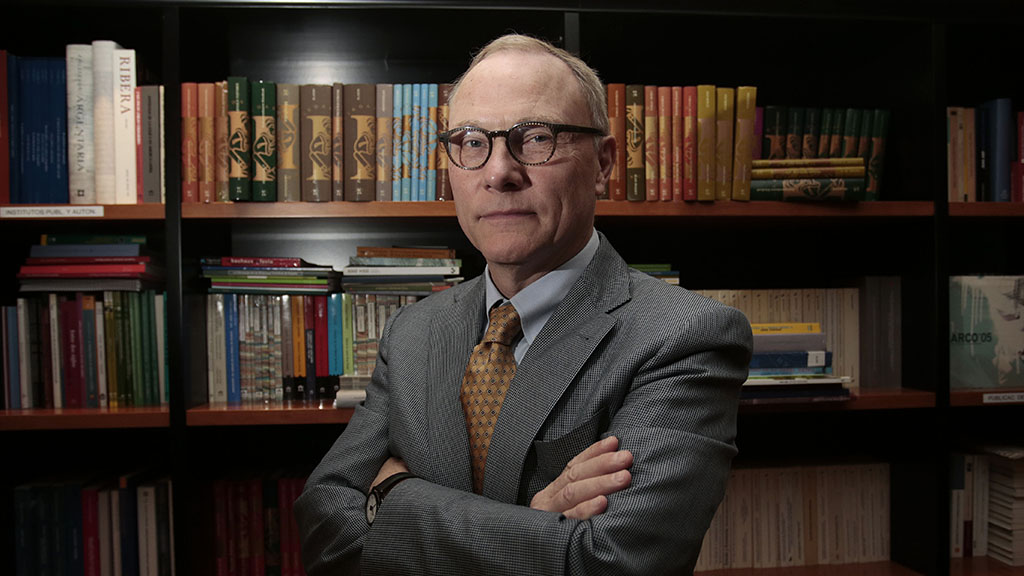
Nobel Prize in Economics for David Card, winner of the 7th Frontiers of Knowledge Award in 2014
Professor David Card (University of California, Berkeley), distinguished with the 7th Frontiers of Knowledge award in Economics, Finance and Management (2014), has today won the Nobel Prize in Economics 2021, along with Joshua D. Angrist (Massachusetts Institute of Technology) and Guido W. Imbens (Stanford University). Card receives half the prize “for his empirical contributions to labor economics,” while Angrist and Imbens share the other half “for their methodological contributions to the analysis of causal relationships.”
11 October, 2021
Canadian David Card (Gelph, Canada, 1956) shared the 7th Frontiers of Knowledge Award in Economics, Finance and Management with British economist Richard Blundell “for their contributions to empirical microeconomics,” said the committee in its citation.
“Motivated by important empirical questions, they developed and estimated appropriate econometric models, making significant methodological contributions in the process. Both are known for their attention to institutional detail, careful and innovative research design, rigorous application of econometric tools, and dispassionate reporting of results,” the Frontiers citation continued.
Manuel Arellano, committee secretary and Professor of Econometrics at the Center of Monetary and Financial Studies (CEMFI) of Banco de España hailed Card as “a pioneer in the use of the technique of natural experiments.” These are empirical studies in which the subjects exposed to the experimental and control conditions are determined by nature or by other factors outside the control of the investigators, along the lines of a random assignation.
A notable influence in public policy design
A Canadian (based in the United States, Card has delved into core labor-market issues such as trade union bargaining, unemployment benefits and welfare programs. He has also made fundamental contributions in regard to immigration, looking at the effects of incoming foreign workers on local employment, and in education, exploring the relationship between educational level and wage disparity.
It all began when Card, then a science undergraduate, tried to help a girlfriend with her economics classes. “I started to read a textbook and found it quite enlightening. I grew up on a farm and the agricultural business is like a puzzle, so it was fun to discover that economics could help me identify some of the pieces.” He went on to earn a PhD in Economics from Princeton University in 1983, and for the next fifteen years continued researching and teaching at this institution.
In 2001 he joined the faculty of the University of California, Berkeley where he now serves as the Class of 1950 Professor of Economics, combining this post with the directorship of the Labor Studies Program at the U.S. National Bureau of Economic Research. A devoted teacher and author, his published output extends to seven books and 90 papers and book chapters.
Among Card’s merits, the Frontiers awards committee cited the impact of his work in promoting evidence-based policy on such varied issues as taxation, welfare and pension reform, the labor market, inequality and product market regulation.
20 Frontiers awardees have gone on to win the Nobel
Following last week’s award of the Nobel Prize in Medicine to David Julius and Ardem Patapoutian and Physics Prize to Klaus Hasselman and Syukuru Manabe, and today’s Economics Nobel to David Card, a total of 20 Frontiers of Knowledge laureates have since won the Nobel.
With today’s prize, 9 Frontiers laureates have subsequently won the Nobel in Economics: Lars Peter Hansen (2013), Jean Tirole (2014), Angus Deaton (2015), William Nordhaus (2018), Abhijit Banerjee and Esther Duflo (2019), Paul Milgrom and Robert Wilson (2020) and David Card (2021).
In the case of the Medicine Nobel, 5 Frontiers laureates have gone on to receive the Swedish Academy’s accolade: Shinya Yamanaka (2011), James P. Allison (2018), and David Julius and Ardem Patapoutian in the 2021 edition decided last week.
Another four Frontiers laureates were later distinguished with the Nobel Prize in Physics: Didier Queloz and Michel G. E. Mayor (2019), and Klaus Hasselman and Syukuru Manabe in the 2021 edition.
Finally, the Chemistry Nobel has found its way to three prior Frontiers laureates: Robert J. Lefkowitz in 2012, and Emmanuelle Charpentier and Jennifer Doudna in 2020.

